Sports and Event Tourism: Types of Tourists, Experiences, and Impacts
VerifiedAdded on 2023/01/18
|11
|3915
|70
AI Summary
This report explores the different types of tourists during sports events, including active and passive sport tourism. It discusses the experiences and motivations of tourists, as well as the impact of sports events on the economy, society, culture, and environment. The report also covers destination planning and managerial issues in sport and event management.
Contribute Materials
Your contribution can guide someone’s learning journey. Share your
documents today.
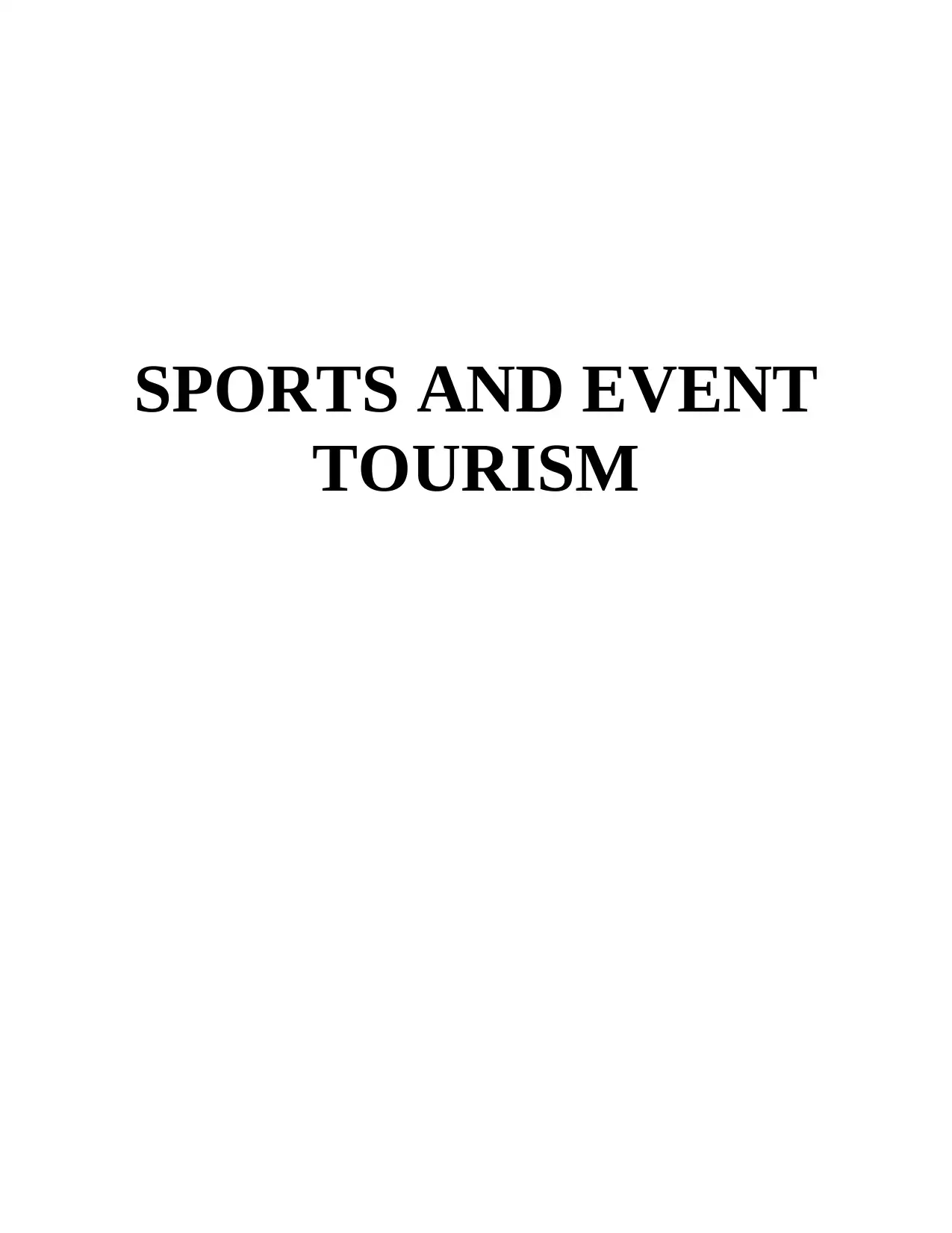
SPORTS AND EVENT
TOURISM
TOURISM
Secure Best Marks with AI Grader
Need help grading? Try our AI Grader for instant feedback on your assignments.
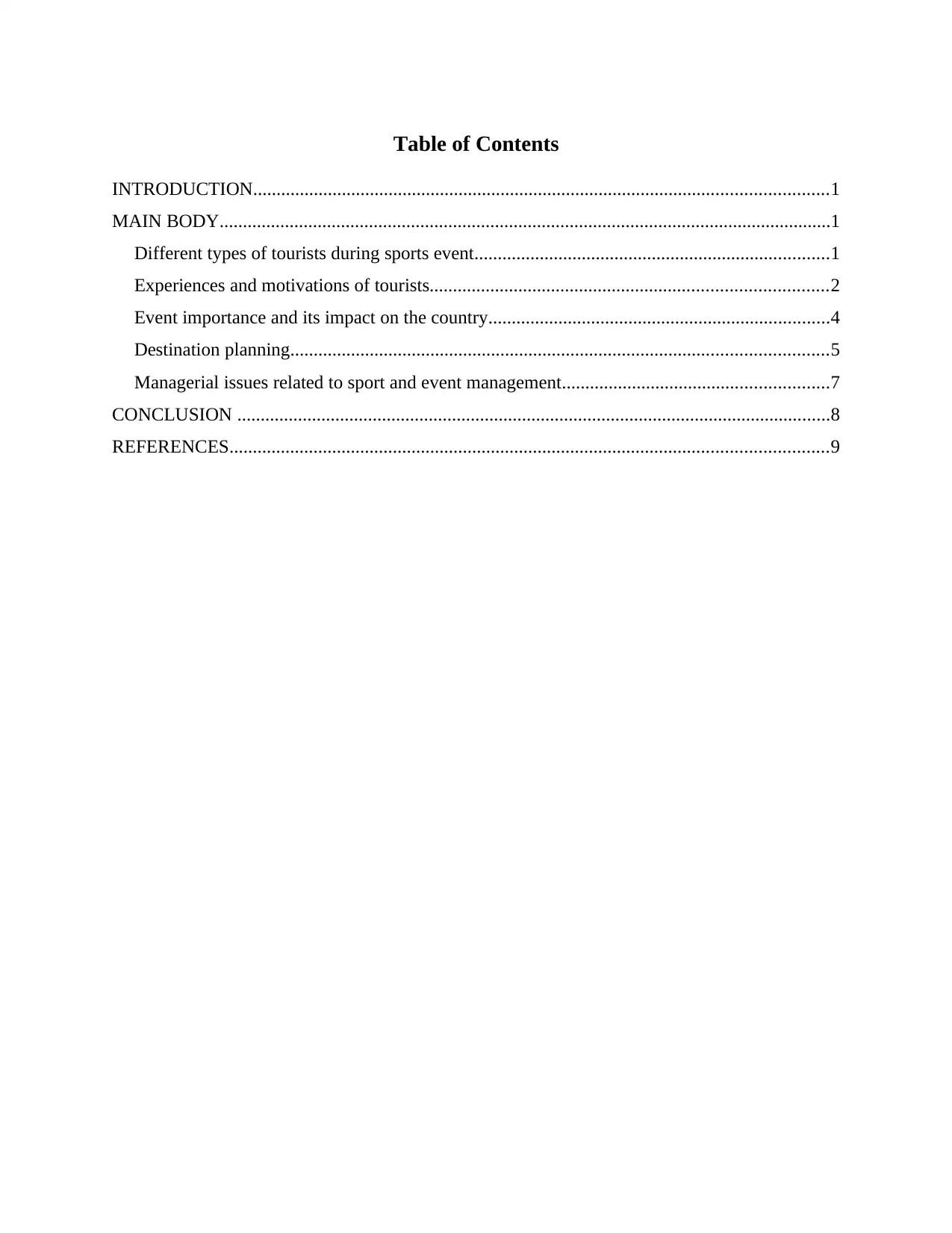
Table of Contents
INTRODUCTION...........................................................................................................................1
MAIN BODY...................................................................................................................................1
Different types of tourists during sports event............................................................................1
Experiences and motivations of tourists.....................................................................................2
Event importance and its impact on the country.........................................................................4
Destination planning...................................................................................................................5
Managerial issues related to sport and event management.........................................................7
CONCLUSION ...............................................................................................................................8
REFERENCES................................................................................................................................9
INTRODUCTION...........................................................................................................................1
MAIN BODY...................................................................................................................................1
Different types of tourists during sports event............................................................................1
Experiences and motivations of tourists.....................................................................................2
Event importance and its impact on the country.........................................................................4
Destination planning...................................................................................................................5
Managerial issues related to sport and event management.........................................................7
CONCLUSION ...............................................................................................................................8
REFERENCES................................................................................................................................9
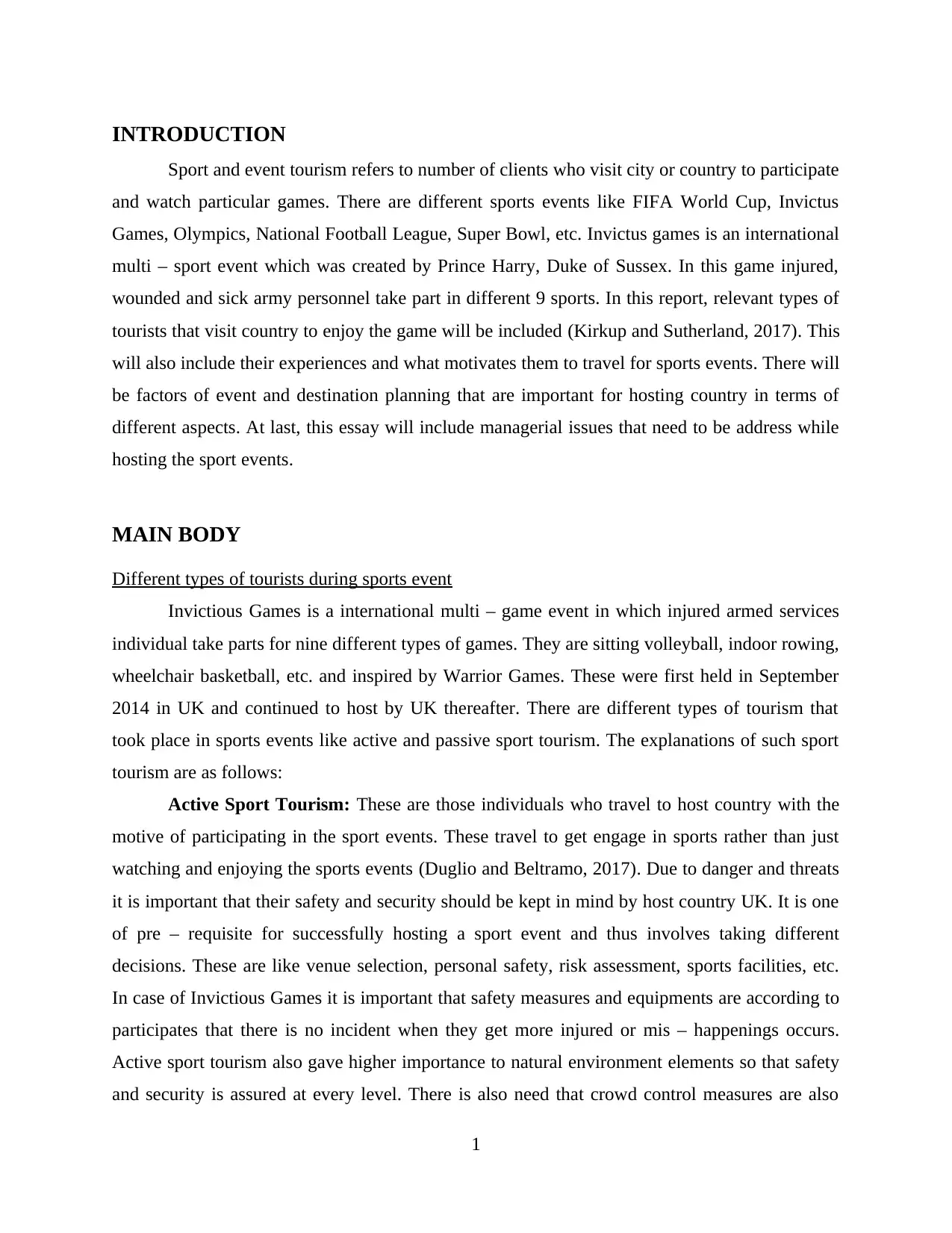
INTRODUCTION
Sport and event tourism refers to number of clients who visit city or country to participate
and watch particular games. There are different sports events like FIFA World Cup, Invictus
Games, Olympics, National Football League, Super Bowl, etc. Invictus games is an international
multi – sport event which was created by Prince Harry, Duke of Sussex. In this game injured,
wounded and sick army personnel take part in different 9 sports. In this report, relevant types of
tourists that visit country to enjoy the game will be included (Kirkup and Sutherland, 2017). This
will also include their experiences and what motivates them to travel for sports events. There will
be factors of event and destination planning that are important for hosting country in terms of
different aspects. At last, this essay will include managerial issues that need to be address while
hosting the sport events.
MAIN BODY
Different types of tourists during sports event
Invictious Games is a international multi – game event in which injured armed services
individual take parts for nine different types of games. They are sitting volleyball, indoor rowing,
wheelchair basketball, etc. and inspired by Warrior Games. These were first held in September
2014 in UK and continued to host by UK thereafter. There are different types of tourism that
took place in sports events like active and passive sport tourism. The explanations of such sport
tourism are as follows:
Active Sport Tourism: These are those individuals who travel to host country with the
motive of participating in the sport events. These travel to get engage in sports rather than just
watching and enjoying the sports events (Duglio and Beltramo, 2017). Due to danger and threats
it is important that their safety and security should be kept in mind by host country UK. It is one
of pre – requisite for successfully hosting a sport event and thus involves taking different
decisions. These are like venue selection, personal safety, risk assessment, sports facilities, etc.
In case of Invictious Games it is important that safety measures and equipments are according to
participates that there is no incident when they get more injured or mis – happenings occurs.
Active sport tourism also gave higher importance to natural environment elements so that safety
and security is assured at every level. There is also need that crowd control measures are also
1
Sport and event tourism refers to number of clients who visit city or country to participate
and watch particular games. There are different sports events like FIFA World Cup, Invictus
Games, Olympics, National Football League, Super Bowl, etc. Invictus games is an international
multi – sport event which was created by Prince Harry, Duke of Sussex. In this game injured,
wounded and sick army personnel take part in different 9 sports. In this report, relevant types of
tourists that visit country to enjoy the game will be included (Kirkup and Sutherland, 2017). This
will also include their experiences and what motivates them to travel for sports events. There will
be factors of event and destination planning that are important for hosting country in terms of
different aspects. At last, this essay will include managerial issues that need to be address while
hosting the sport events.
MAIN BODY
Different types of tourists during sports event
Invictious Games is a international multi – game event in which injured armed services
individual take parts for nine different types of games. They are sitting volleyball, indoor rowing,
wheelchair basketball, etc. and inspired by Warrior Games. These were first held in September
2014 in UK and continued to host by UK thereafter. There are different types of tourism that
took place in sports events like active and passive sport tourism. The explanations of such sport
tourism are as follows:
Active Sport Tourism: These are those individuals who travel to host country with the
motive of participating in the sport events. These travel to get engage in sports rather than just
watching and enjoying the sports events (Duglio and Beltramo, 2017). Due to danger and threats
it is important that their safety and security should be kept in mind by host country UK. It is one
of pre – requisite for successfully hosting a sport event and thus involves taking different
decisions. These are like venue selection, personal safety, risk assessment, sports facilities, etc.
In case of Invictious Games it is important that safety measures and equipments are according to
participates that there is no incident when they get more injured or mis – happenings occurs.
Active sport tourism also gave higher importance to natural environment elements so that safety
and security is assured at every level. There is also need that crowd control measures are also
1
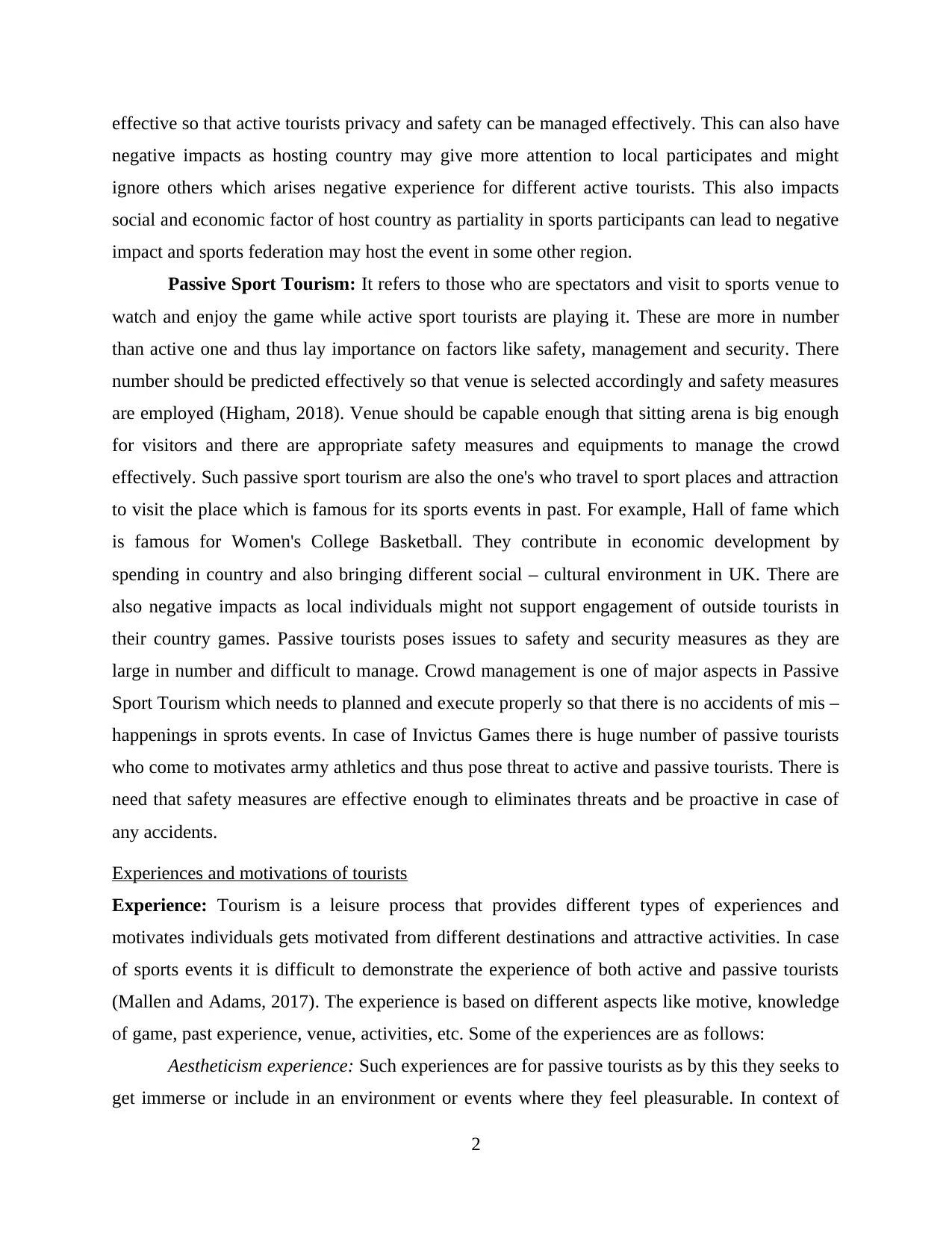
effective so that active tourists privacy and safety can be managed effectively. This can also have
negative impacts as hosting country may give more attention to local participates and might
ignore others which arises negative experience for different active tourists. This also impacts
social and economic factor of host country as partiality in sports participants can lead to negative
impact and sports federation may host the event in some other region.
Passive Sport Tourism: It refers to those who are spectators and visit to sports venue to
watch and enjoy the game while active sport tourists are playing it. These are more in number
than active one and thus lay importance on factors like safety, management and security. There
number should be predicted effectively so that venue is selected accordingly and safety measures
are employed (Higham, 2018). Venue should be capable enough that sitting arena is big enough
for visitors and there are appropriate safety measures and equipments to manage the crowd
effectively. Such passive sport tourism are also the one's who travel to sport places and attraction
to visit the place which is famous for its sports events in past. For example, Hall of fame which
is famous for Women's College Basketball. They contribute in economic development by
spending in country and also bringing different social – cultural environment in UK. There are
also negative impacts as local individuals might not support engagement of outside tourists in
their country games. Passive tourists poses issues to safety and security measures as they are
large in number and difficult to manage. Crowd management is one of major aspects in Passive
Sport Tourism which needs to planned and execute properly so that there is no accidents of mis –
happenings in sprots events. In case of Invictus Games there is huge number of passive tourists
who come to motivates army athletics and thus pose threat to active and passive tourists. There is
need that safety measures are effective enough to eliminates threats and be proactive in case of
any accidents.
Experiences and motivations of tourists
Experience: Tourism is a leisure process that provides different types of experiences and
motivates individuals gets motivated from different destinations and attractive activities. In case
of sports events it is difficult to demonstrate the experience of both active and passive tourists
(Mallen and Adams, 2017). The experience is based on different aspects like motive, knowledge
of game, past experience, venue, activities, etc. Some of the experiences are as follows:
Aestheticism experience: Such experiences are for passive tourists as by this they seeks to
get immerse or include in an environment or events where they feel pleasurable. In context of
2
negative impacts as hosting country may give more attention to local participates and might
ignore others which arises negative experience for different active tourists. This also impacts
social and economic factor of host country as partiality in sports participants can lead to negative
impact and sports federation may host the event in some other region.
Passive Sport Tourism: It refers to those who are spectators and visit to sports venue to
watch and enjoy the game while active sport tourists are playing it. These are more in number
than active one and thus lay importance on factors like safety, management and security. There
number should be predicted effectively so that venue is selected accordingly and safety measures
are employed (Higham, 2018). Venue should be capable enough that sitting arena is big enough
for visitors and there are appropriate safety measures and equipments to manage the crowd
effectively. Such passive sport tourism are also the one's who travel to sport places and attraction
to visit the place which is famous for its sports events in past. For example, Hall of fame which
is famous for Women's College Basketball. They contribute in economic development by
spending in country and also bringing different social – cultural environment in UK. There are
also negative impacts as local individuals might not support engagement of outside tourists in
their country games. Passive tourists poses issues to safety and security measures as they are
large in number and difficult to manage. Crowd management is one of major aspects in Passive
Sport Tourism which needs to planned and execute properly so that there is no accidents of mis –
happenings in sprots events. In case of Invictus Games there is huge number of passive tourists
who come to motivates army athletics and thus pose threat to active and passive tourists. There is
need that safety measures are effective enough to eliminates threats and be proactive in case of
any accidents.
Experiences and motivations of tourists
Experience: Tourism is a leisure process that provides different types of experiences and
motivates individuals gets motivated from different destinations and attractive activities. In case
of sports events it is difficult to demonstrate the experience of both active and passive tourists
(Mallen and Adams, 2017). The experience is based on different aspects like motive, knowledge
of game, past experience, venue, activities, etc. Some of the experiences are as follows:
Aestheticism experience: Such experiences are for passive tourists as by this they seeks to
get immerse or include in an environment or events where they feel pleasurable. In context of
2
Secure Best Marks with AI Grader
Need help grading? Try our AI Grader for instant feedback on your assignments.
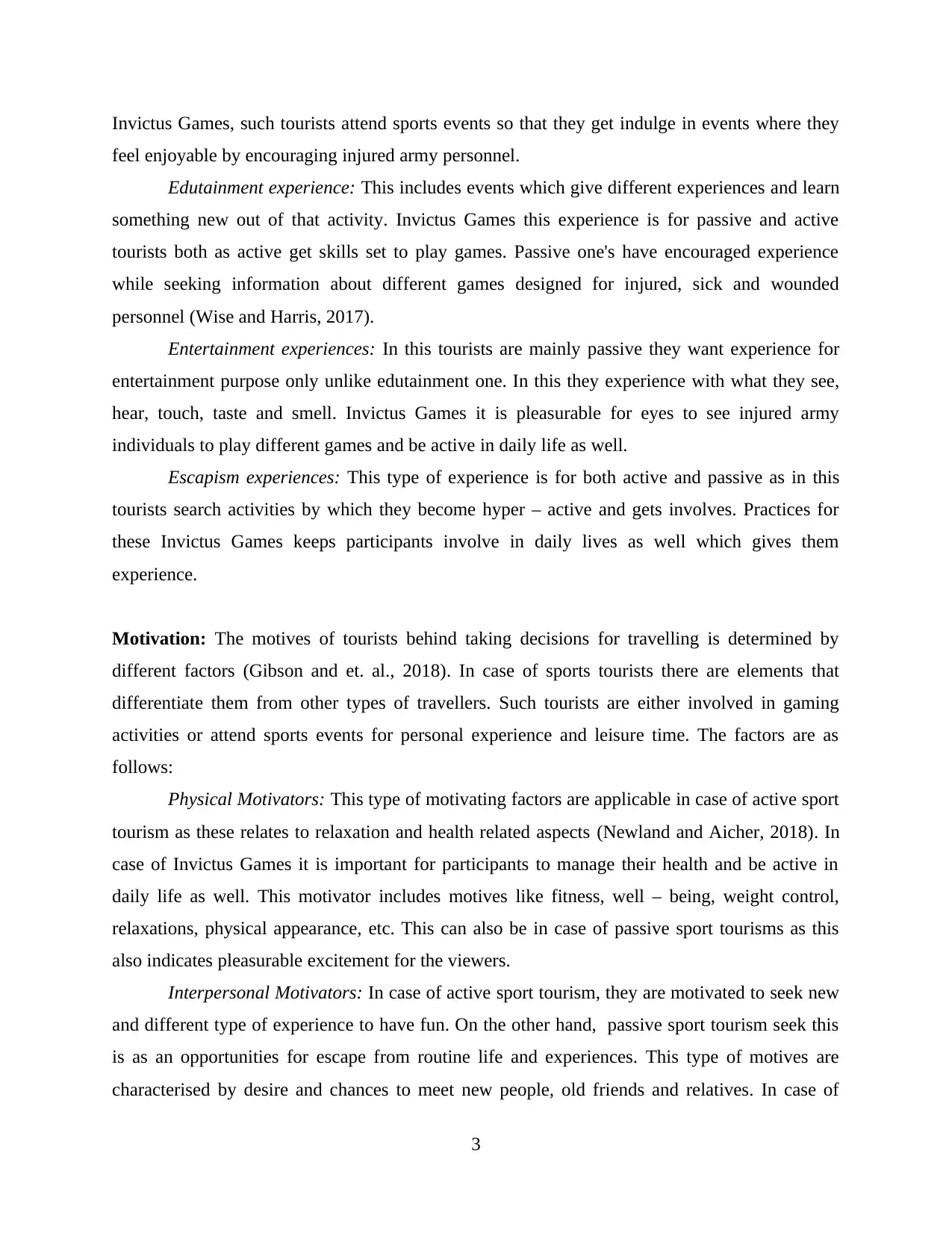
Invictus Games, such tourists attend sports events so that they get indulge in events where they
feel enjoyable by encouraging injured army personnel.
Edutainment experience: This includes events which give different experiences and learn
something new out of that activity. Invictus Games this experience is for passive and active
tourists both as active get skills set to play games. Passive one's have encouraged experience
while seeking information about different games designed for injured, sick and wounded
personnel (Wise and Harris, 2017).
Entertainment experiences: In this tourists are mainly passive they want experience for
entertainment purpose only unlike edutainment one. In this they experience with what they see,
hear, touch, taste and smell. Invictus Games it is pleasurable for eyes to see injured army
individuals to play different games and be active in daily life as well.
Escapism experiences: This type of experience is for both active and passive as in this
tourists search activities by which they become hyper – active and gets involves. Practices for
these Invictus Games keeps participants involve in daily lives as well which gives them
experience.
Motivation: The motives of tourists behind taking decisions for travelling is determined by
different factors (Gibson and et. al., 2018). In case of sports tourists there are elements that
differentiate them from other types of travellers. Such tourists are either involved in gaming
activities or attend sports events for personal experience and leisure time. The factors are as
follows:
Physical Motivators: This type of motivating factors are applicable in case of active sport
tourism as these relates to relaxation and health related aspects (Newland and Aicher, 2018). In
case of Invictus Games it is important for participants to manage their health and be active in
daily life as well. This motivator includes motives like fitness, well – being, weight control,
relaxations, physical appearance, etc. This can also be in case of passive sport tourisms as this
also indicates pleasurable excitement for the viewers.
Interpersonal Motivators: In case of active sport tourism, they are motivated to seek new
and different type of experience to have fun. On the other hand, passive sport tourism seek this
is as an opportunities for escape from routine life and experiences. This type of motives are
characterised by desire and chances to meet new people, old friends and relatives. In case of
3
feel enjoyable by encouraging injured army personnel.
Edutainment experience: This includes events which give different experiences and learn
something new out of that activity. Invictus Games this experience is for passive and active
tourists both as active get skills set to play games. Passive one's have encouraged experience
while seeking information about different games designed for injured, sick and wounded
personnel (Wise and Harris, 2017).
Entertainment experiences: In this tourists are mainly passive they want experience for
entertainment purpose only unlike edutainment one. In this they experience with what they see,
hear, touch, taste and smell. Invictus Games it is pleasurable for eyes to see injured army
individuals to play different games and be active in daily life as well.
Escapism experiences: This type of experience is for both active and passive as in this
tourists search activities by which they become hyper – active and gets involves. Practices for
these Invictus Games keeps participants involve in daily lives as well which gives them
experience.
Motivation: The motives of tourists behind taking decisions for travelling is determined by
different factors (Gibson and et. al., 2018). In case of sports tourists there are elements that
differentiate them from other types of travellers. Such tourists are either involved in gaming
activities or attend sports events for personal experience and leisure time. The factors are as
follows:
Physical Motivators: This type of motivating factors are applicable in case of active sport
tourism as these relates to relaxation and health related aspects (Newland and Aicher, 2018). In
case of Invictus Games it is important for participants to manage their health and be active in
daily life as well. This motivator includes motives like fitness, well – being, weight control,
relaxations, physical appearance, etc. This can also be in case of passive sport tourisms as this
also indicates pleasurable excitement for the viewers.
Interpersonal Motivators: In case of active sport tourism, they are motivated to seek new
and different type of experience to have fun. On the other hand, passive sport tourism seek this
is as an opportunities for escape from routine life and experiences. This type of motives are
characterised by desire and chances to meet new people, old friends and relatives. In case of
3
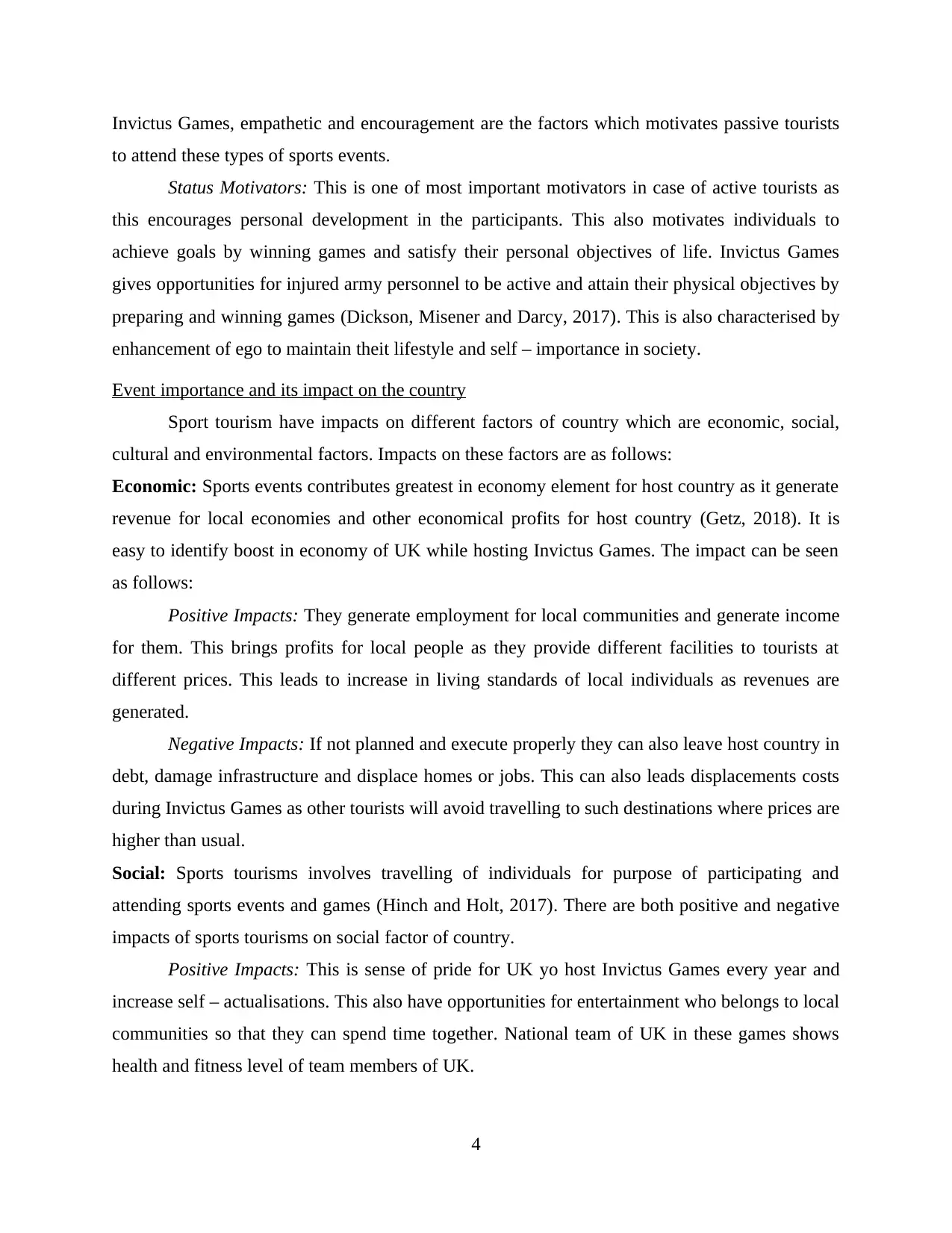
Invictus Games, empathetic and encouragement are the factors which motivates passive tourists
to attend these types of sports events.
Status Motivators: This is one of most important motivators in case of active tourists as
this encourages personal development in the participants. This also motivates individuals to
achieve goals by winning games and satisfy their personal objectives of life. Invictus Games
gives opportunities for injured army personnel to be active and attain their physical objectives by
preparing and winning games (Dickson, Misener and Darcy, 2017). This is also characterised by
enhancement of ego to maintain theit lifestyle and self – importance in society.
Event importance and its impact on the country
Sport tourism have impacts on different factors of country which are economic, social,
cultural and environmental factors. Impacts on these factors are as follows:
Economic: Sports events contributes greatest in economy element for host country as it generate
revenue for local economies and other economical profits for host country (Getz, 2018). It is
easy to identify boost in economy of UK while hosting Invictus Games. The impact can be seen
as follows:
Positive Impacts: They generate employment for local communities and generate income
for them. This brings profits for local people as they provide different facilities to tourists at
different prices. This leads to increase in living standards of local individuals as revenues are
generated.
Negative Impacts: If not planned and execute properly they can also leave host country in
debt, damage infrastructure and displace homes or jobs. This can also leads displacements costs
during Invictus Games as other tourists will avoid travelling to such destinations where prices are
higher than usual.
Social: Sports tourisms involves travelling of individuals for purpose of participating and
attending sports events and games (Hinch and Holt, 2017). There are both positive and negative
impacts of sports tourisms on social factor of country.
Positive Impacts: This is sense of pride for UK yo host Invictus Games every year and
increase self – actualisations. This also have opportunities for entertainment who belongs to local
communities so that they can spend time together. National team of UK in these games shows
health and fitness level of team members of UK.
4
to attend these types of sports events.
Status Motivators: This is one of most important motivators in case of active tourists as
this encourages personal development in the participants. This also motivates individuals to
achieve goals by winning games and satisfy their personal objectives of life. Invictus Games
gives opportunities for injured army personnel to be active and attain their physical objectives by
preparing and winning games (Dickson, Misener and Darcy, 2017). This is also characterised by
enhancement of ego to maintain theit lifestyle and self – importance in society.
Event importance and its impact on the country
Sport tourism have impacts on different factors of country which are economic, social,
cultural and environmental factors. Impacts on these factors are as follows:
Economic: Sports events contributes greatest in economy element for host country as it generate
revenue for local economies and other economical profits for host country (Getz, 2018). It is
easy to identify boost in economy of UK while hosting Invictus Games. The impact can be seen
as follows:
Positive Impacts: They generate employment for local communities and generate income
for them. This brings profits for local people as they provide different facilities to tourists at
different prices. This leads to increase in living standards of local individuals as revenues are
generated.
Negative Impacts: If not planned and execute properly they can also leave host country in
debt, damage infrastructure and displace homes or jobs. This can also leads displacements costs
during Invictus Games as other tourists will avoid travelling to such destinations where prices are
higher than usual.
Social: Sports tourisms involves travelling of individuals for purpose of participating and
attending sports events and games (Hinch and Holt, 2017). There are both positive and negative
impacts of sports tourisms on social factor of country.
Positive Impacts: This is sense of pride for UK yo host Invictus Games every year and
increase self – actualisations. This also have opportunities for entertainment who belongs to local
communities so that they can spend time together. National team of UK in these games shows
health and fitness level of team members of UK.
4
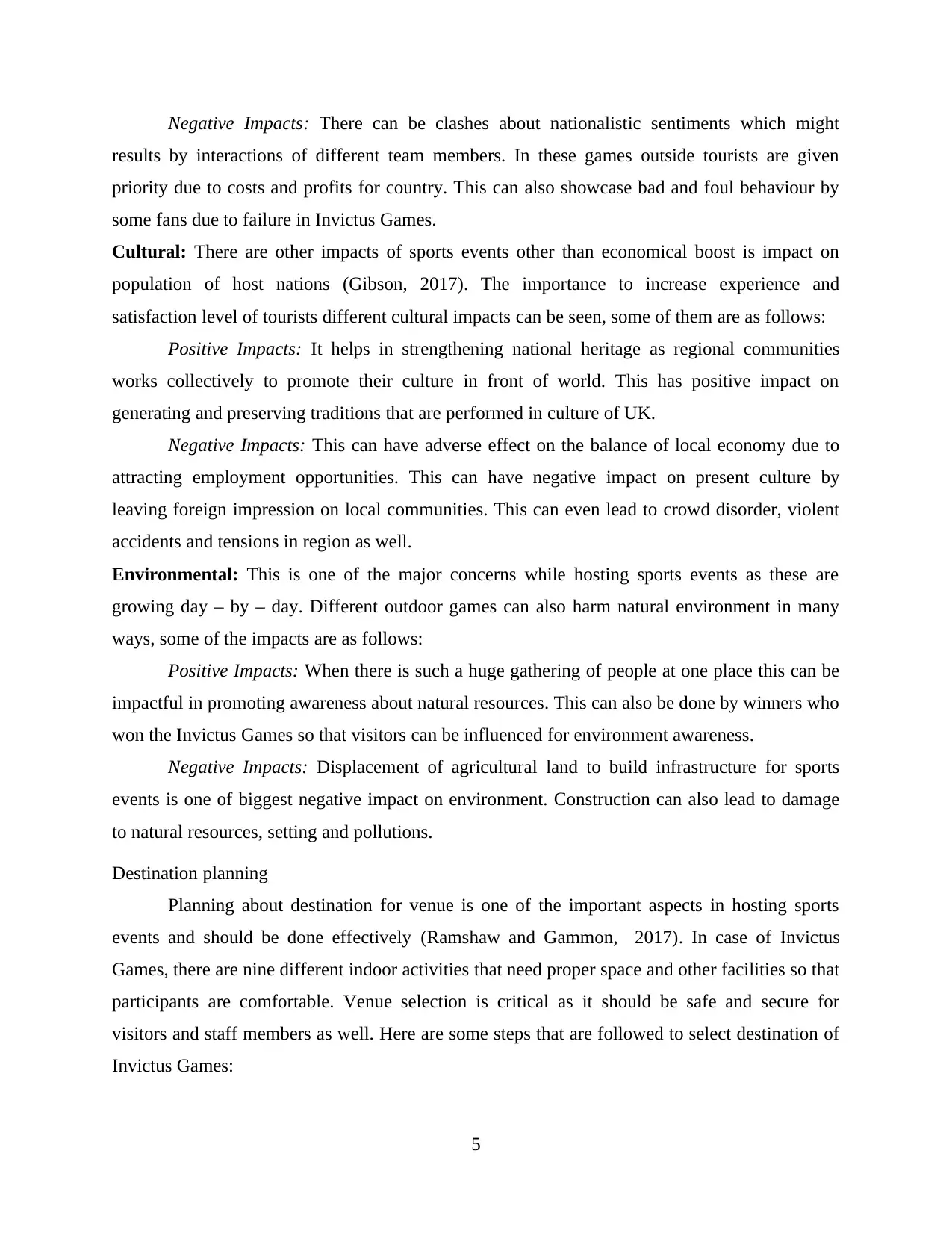
Negative Impacts: There can be clashes about nationalistic sentiments which might
results by interactions of different team members. In these games outside tourists are given
priority due to costs and profits for country. This can also showcase bad and foul behaviour by
some fans due to failure in Invictus Games.
Cultural: There are other impacts of sports events other than economical boost is impact on
population of host nations (Gibson, 2017). The importance to increase experience and
satisfaction level of tourists different cultural impacts can be seen, some of them are as follows:
Positive Impacts: It helps in strengthening national heritage as regional communities
works collectively to promote their culture in front of world. This has positive impact on
generating and preserving traditions that are performed in culture of UK.
Negative Impacts: This can have adverse effect on the balance of local economy due to
attracting employment opportunities. This can have negative impact on present culture by
leaving foreign impression on local communities. This can even lead to crowd disorder, violent
accidents and tensions in region as well.
Environmental: This is one of the major concerns while hosting sports events as these are
growing day – by – day. Different outdoor games can also harm natural environment in many
ways, some of the impacts are as follows:
Positive Impacts: When there is such a huge gathering of people at one place this can be
impactful in promoting awareness about natural resources. This can also be done by winners who
won the Invictus Games so that visitors can be influenced for environment awareness.
Negative Impacts: Displacement of agricultural land to build infrastructure for sports
events is one of biggest negative impact on environment. Construction can also lead to damage
to natural resources, setting and pollutions.
Destination planning
Planning about destination for venue is one of the important aspects in hosting sports
events and should be done effectively (Ramshaw and Gammon, 2017). In case of Invictus
Games, there are nine different indoor activities that need proper space and other facilities so that
participants are comfortable. Venue selection is critical as it should be safe and secure for
visitors and staff members as well. Here are some steps that are followed to select destination of
Invictus Games:
5
results by interactions of different team members. In these games outside tourists are given
priority due to costs and profits for country. This can also showcase bad and foul behaviour by
some fans due to failure in Invictus Games.
Cultural: There are other impacts of sports events other than economical boost is impact on
population of host nations (Gibson, 2017). The importance to increase experience and
satisfaction level of tourists different cultural impacts can be seen, some of them are as follows:
Positive Impacts: It helps in strengthening national heritage as regional communities
works collectively to promote their culture in front of world. This has positive impact on
generating and preserving traditions that are performed in culture of UK.
Negative Impacts: This can have adverse effect on the balance of local economy due to
attracting employment opportunities. This can have negative impact on present culture by
leaving foreign impression on local communities. This can even lead to crowd disorder, violent
accidents and tensions in region as well.
Environmental: This is one of the major concerns while hosting sports events as these are
growing day – by – day. Different outdoor games can also harm natural environment in many
ways, some of the impacts are as follows:
Positive Impacts: When there is such a huge gathering of people at one place this can be
impactful in promoting awareness about natural resources. This can also be done by winners who
won the Invictus Games so that visitors can be influenced for environment awareness.
Negative Impacts: Displacement of agricultural land to build infrastructure for sports
events is one of biggest negative impact on environment. Construction can also lead to damage
to natural resources, setting and pollutions.
Destination planning
Planning about destination for venue is one of the important aspects in hosting sports
events and should be done effectively (Ramshaw and Gammon, 2017). In case of Invictus
Games, there are nine different indoor activities that need proper space and other facilities so that
participants are comfortable. Venue selection is critical as it should be safe and secure for
visitors and staff members as well. Here are some steps that are followed to select destination of
Invictus Games:
5
Paraphrase This Document
Need a fresh take? Get an instant paraphrase of this document with our AI Paraphraser

Analyse need of event: In this step needs are analyse so that venue planning can be done
according to those factors. In case of Invictus Games there are nine different indoor games that
will require huge infrastructure to host. Number of visitors will also be identify so that setup can
be planned as well. There is need that it should be near to airports and other transport facilities so
that it is easily accessible by foreign visitors.
Investigate possible venue: In this different alternatives will be investigated from
available options so that best can be selected. This is in case of Invictus Games will be done by
sports federations so that there will be events are organised effectively (Mackellar and Nisbet,
2017). This is done by maintaining database and checking credibility of venue in terns of safety
and security. For this government of UK can hire a event management organisation who is
effective in planning and executing such mega – sports events at international level.
Visiting site: There is need that inspection is done personally so that infrastructure can be
developed as blue print in starting stage. This can be done with visiting more than one event
destination so that best one can be finalised. The purpose is to find out sustainability of the venue
in terms of dimensions which is area or height in indoor games of Invictus Games. Another is
environment which is maintenance, safety, ventilation and other factors. Adequate number of
facilities, accessibility by public transport and cost of venue are other sustainability factors.
Selection: After evaluating each alternatives and feasibility study, final decisions is made
about destination planning. This is one of most important step in this process and should be done
effectively for success of sports events. In case of Invictus Games, it is necessary that
participants are kept in mind as they are injured or wounded army personnels. So there is need
that government of UK analyse each and every factor before finalising venue for sports event.
Communicating: After the final selection, next step is to communicate about destination
of sports events to general public, participants, media and other share holders (Perić, Vitezić and
Badurina, 2019). This can be done with invitations sent to participants, social media platforms, e-
mails, print media, etc. This ensures that each and every interested individual is informed about
the destination where Invictus Games are being hosted.
Arranging basic facilities: In the last stage government of UK or events management
company will make sure that venue is fit and appropriate for use. There are different amenities
that should be provided to participants, visitors and working professionals so that they ate
effective in their performances. Safety and security measures are also arranges so that venue is
6
according to those factors. In case of Invictus Games there are nine different indoor games that
will require huge infrastructure to host. Number of visitors will also be identify so that setup can
be planned as well. There is need that it should be near to airports and other transport facilities so
that it is easily accessible by foreign visitors.
Investigate possible venue: In this different alternatives will be investigated from
available options so that best can be selected. This is in case of Invictus Games will be done by
sports federations so that there will be events are organised effectively (Mackellar and Nisbet,
2017). This is done by maintaining database and checking credibility of venue in terns of safety
and security. For this government of UK can hire a event management organisation who is
effective in planning and executing such mega – sports events at international level.
Visiting site: There is need that inspection is done personally so that infrastructure can be
developed as blue print in starting stage. This can be done with visiting more than one event
destination so that best one can be finalised. The purpose is to find out sustainability of the venue
in terms of dimensions which is area or height in indoor games of Invictus Games. Another is
environment which is maintenance, safety, ventilation and other factors. Adequate number of
facilities, accessibility by public transport and cost of venue are other sustainability factors.
Selection: After evaluating each alternatives and feasibility study, final decisions is made
about destination planning. This is one of most important step in this process and should be done
effectively for success of sports events. In case of Invictus Games, it is necessary that
participants are kept in mind as they are injured or wounded army personnels. So there is need
that government of UK analyse each and every factor before finalising venue for sports event.
Communicating: After the final selection, next step is to communicate about destination
of sports events to general public, participants, media and other share holders (Perić, Vitezić and
Badurina, 2019). This can be done with invitations sent to participants, social media platforms, e-
mails, print media, etc. This ensures that each and every interested individual is informed about
the destination where Invictus Games are being hosted.
Arranging basic facilities: In the last stage government of UK or events management
company will make sure that venue is fit and appropriate for use. There are different amenities
that should be provided to participants, visitors and working professionals so that they ate
effective in their performances. Safety and security measures are also arranges so that venue is
6
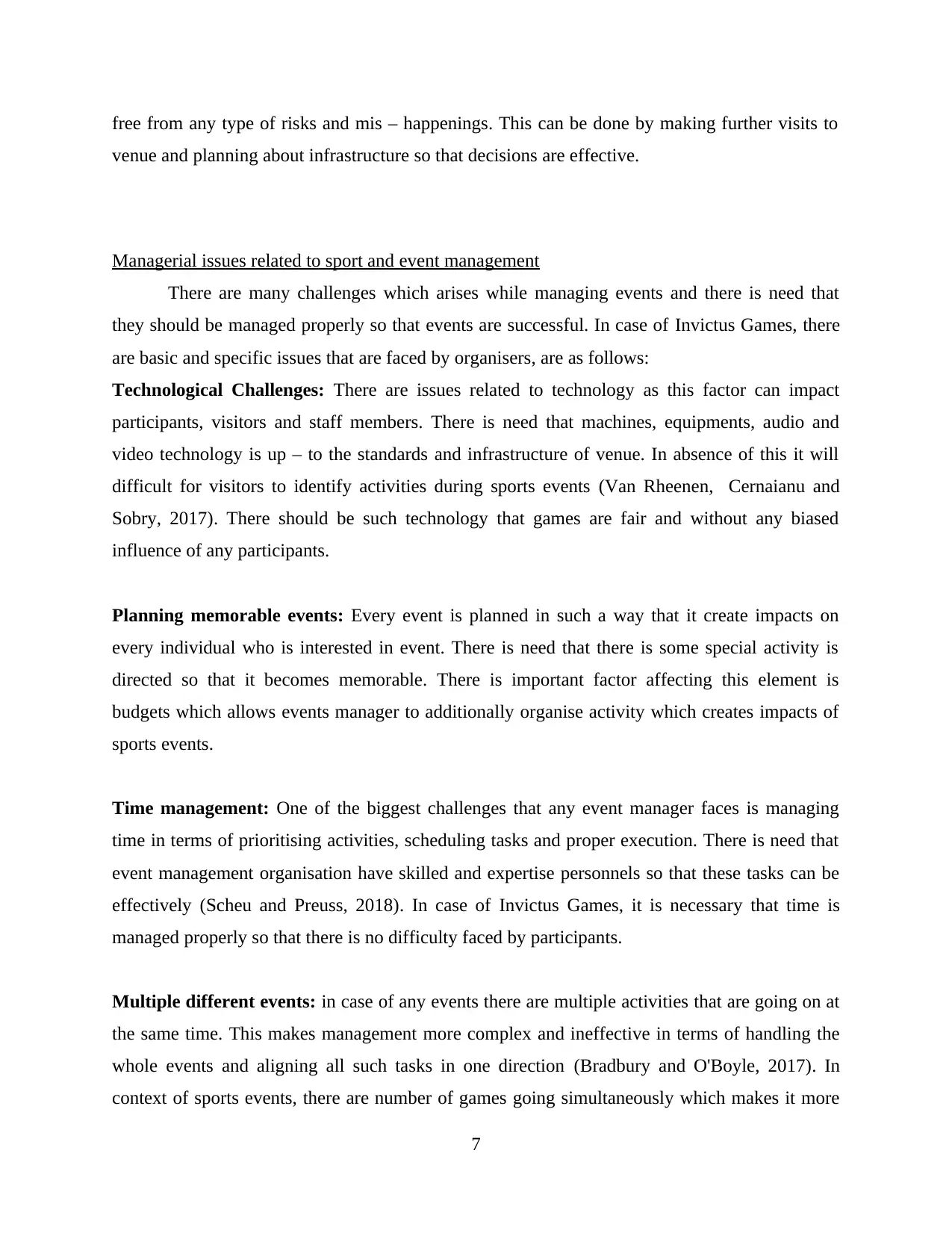
free from any type of risks and mis – happenings. This can be done by making further visits to
venue and planning about infrastructure so that decisions are effective.
Managerial issues related to sport and event management
There are many challenges which arises while managing events and there is need that
they should be managed properly so that events are successful. In case of Invictus Games, there
are basic and specific issues that are faced by organisers, are as follows:
Technological Challenges: There are issues related to technology as this factor can impact
participants, visitors and staff members. There is need that machines, equipments, audio and
video technology is up – to the standards and infrastructure of venue. In absence of this it will
difficult for visitors to identify activities during sports events (Van Rheenen, Cernaianu and
Sobry, 2017). There should be such technology that games are fair and without any biased
influence of any participants.
Planning memorable events: Every event is planned in such a way that it create impacts on
every individual who is interested in event. There is need that there is some special activity is
directed so that it becomes memorable. There is important factor affecting this element is
budgets which allows events manager to additionally organise activity which creates impacts of
sports events.
Time management: One of the biggest challenges that any event manager faces is managing
time in terms of prioritising activities, scheduling tasks and proper execution. There is need that
event management organisation have skilled and expertise personnels so that these tasks can be
effectively (Scheu and Preuss, 2018). In case of Invictus Games, it is necessary that time is
managed properly so that there is no difficulty faced by participants.
Multiple different events: in case of any events there are multiple activities that are going on at
the same time. This makes management more complex and ineffective in terms of handling the
whole events and aligning all such tasks in one direction (Bradbury and O'Boyle, 2017). In
context of sports events, there are number of games going simultaneously which makes it more
7
venue and planning about infrastructure so that decisions are effective.
Managerial issues related to sport and event management
There are many challenges which arises while managing events and there is need that
they should be managed properly so that events are successful. In case of Invictus Games, there
are basic and specific issues that are faced by organisers, are as follows:
Technological Challenges: There are issues related to technology as this factor can impact
participants, visitors and staff members. There is need that machines, equipments, audio and
video technology is up – to the standards and infrastructure of venue. In absence of this it will
difficult for visitors to identify activities during sports events (Van Rheenen, Cernaianu and
Sobry, 2017). There should be such technology that games are fair and without any biased
influence of any participants.
Planning memorable events: Every event is planned in such a way that it create impacts on
every individual who is interested in event. There is need that there is some special activity is
directed so that it becomes memorable. There is important factor affecting this element is
budgets which allows events manager to additionally organise activity which creates impacts of
sports events.
Time management: One of the biggest challenges that any event manager faces is managing
time in terms of prioritising activities, scheduling tasks and proper execution. There is need that
event management organisation have skilled and expertise personnels so that these tasks can be
effectively (Scheu and Preuss, 2018). In case of Invictus Games, it is necessary that time is
managed properly so that there is no difficulty faced by participants.
Multiple different events: in case of any events there are multiple activities that are going on at
the same time. This makes management more complex and ineffective in terms of handling the
whole events and aligning all such tasks in one direction (Bradbury and O'Boyle, 2017). In
context of sports events, there are number of games going simultaneously which makes it more
7
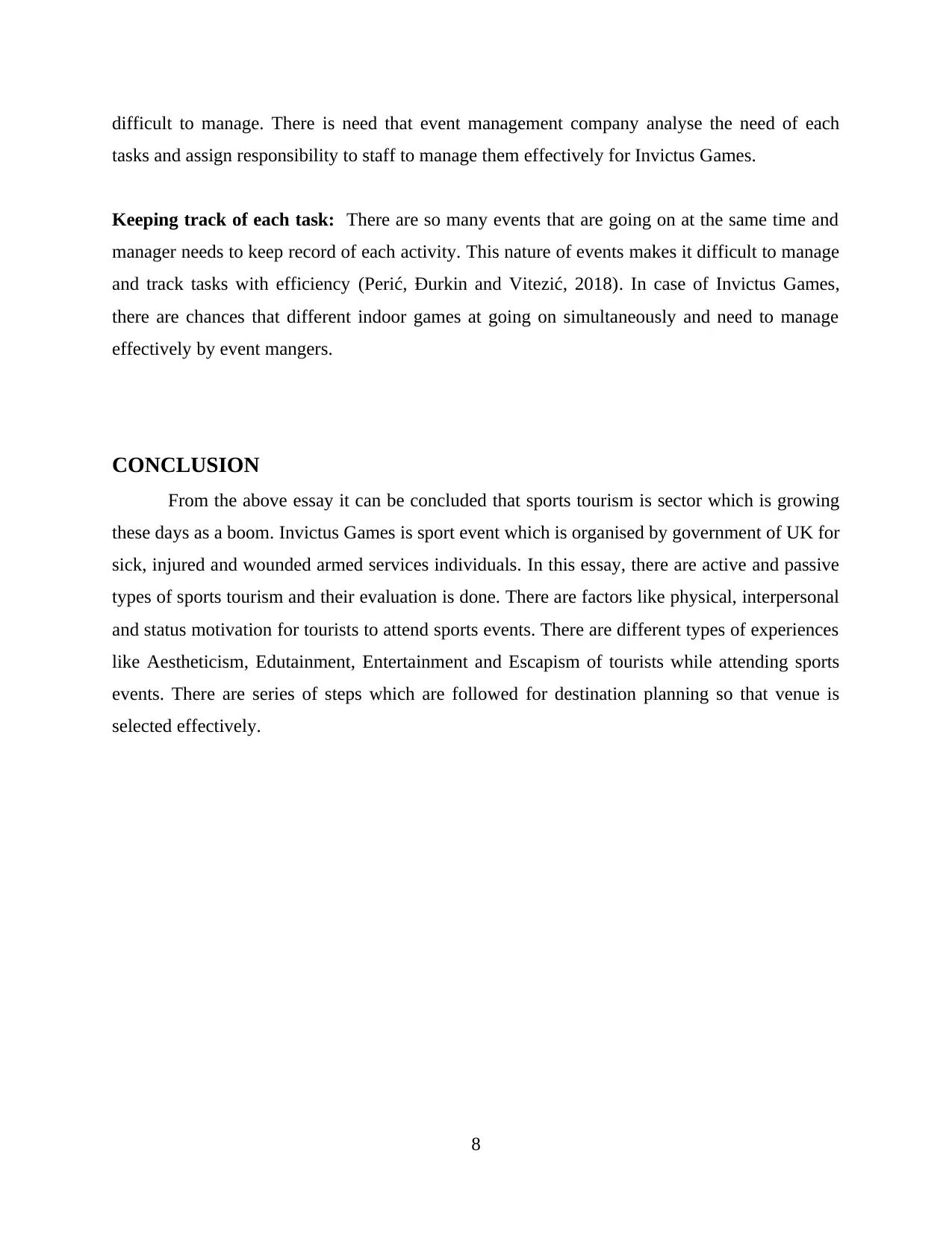
difficult to manage. There is need that event management company analyse the need of each
tasks and assign responsibility to staff to manage them effectively for Invictus Games.
Keeping track of each task: There are so many events that are going on at the same time and
manager needs to keep record of each activity. This nature of events makes it difficult to manage
and track tasks with efficiency (Perić, Đurkin and Vitezić, 2018). In case of Invictus Games,
there are chances that different indoor games at going on simultaneously and need to manage
effectively by event mangers.
CONCLUSION
From the above essay it can be concluded that sports tourism is sector which is growing
these days as a boom. Invictus Games is sport event which is organised by government of UK for
sick, injured and wounded armed services individuals. In this essay, there are active and passive
types of sports tourism and their evaluation is done. There are factors like physical, interpersonal
and status motivation for tourists to attend sports events. There are different types of experiences
like Aestheticism, Edutainment, Entertainment and Escapism of tourists while attending sports
events. There are series of steps which are followed for destination planning so that venue is
selected effectively.
8
tasks and assign responsibility to staff to manage them effectively for Invictus Games.
Keeping track of each task: There are so many events that are going on at the same time and
manager needs to keep record of each activity. This nature of events makes it difficult to manage
and track tasks with efficiency (Perić, Đurkin and Vitezić, 2018). In case of Invictus Games,
there are chances that different indoor games at going on simultaneously and need to manage
effectively by event mangers.
CONCLUSION
From the above essay it can be concluded that sports tourism is sector which is growing
these days as a boom. Invictus Games is sport event which is organised by government of UK for
sick, injured and wounded armed services individuals. In this essay, there are active and passive
types of sports tourism and their evaluation is done. There are factors like physical, interpersonal
and status motivation for tourists to attend sports events. There are different types of experiences
like Aestheticism, Edutainment, Entertainment and Escapism of tourists while attending sports
events. There are series of steps which are followed for destination planning so that venue is
selected effectively.
8
Secure Best Marks with AI Grader
Need help grading? Try our AI Grader for instant feedback on your assignments.
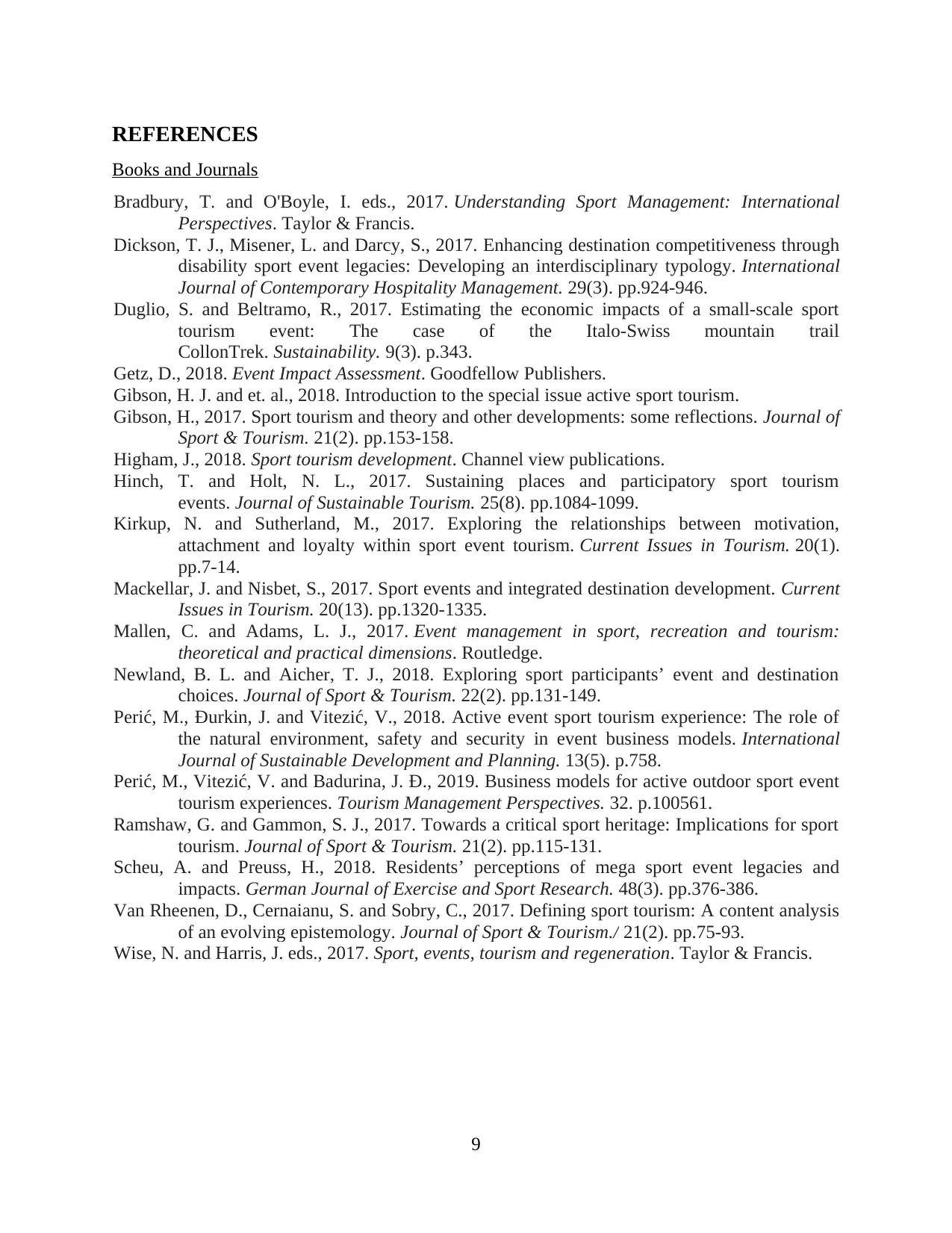
REFERENCES
Books and Journals
Bradbury, T. and O'Boyle, I. eds., 2017. Understanding Sport Management: International
Perspectives. Taylor & Francis.
Dickson, T. J., Misener, L. and Darcy, S., 2017. Enhancing destination competitiveness through
disability sport event legacies: Developing an interdisciplinary typology. International
Journal of Contemporary Hospitality Management. 29(3). pp.924-946.
Duglio, S. and Beltramo, R., 2017. Estimating the economic impacts of a small-scale sport
tourism event: The case of the Italo-Swiss mountain trail
CollonTrek. Sustainability. 9(3). p.343.
Getz, D., 2018. Event Impact Assessment. Goodfellow Publishers.
Gibson, H. J. and et. al., 2018. Introduction to the special issue active sport tourism.
Gibson, H., 2017. Sport tourism and theory and other developments: some reflections. Journal of
Sport & Tourism. 21(2). pp.153-158.
Higham, J., 2018. Sport tourism development. Channel view publications.
Hinch, T. and Holt, N. L., 2017. Sustaining places and participatory sport tourism
events. Journal of Sustainable Tourism. 25(8). pp.1084-1099.
Kirkup, N. and Sutherland, M., 2017. Exploring the relationships between motivation,
attachment and loyalty within sport event tourism. Current Issues in Tourism. 20(1).
pp.7-14.
Mackellar, J. and Nisbet, S., 2017. Sport events and integrated destination development. Current
Issues in Tourism. 20(13). pp.1320-1335.
Mallen, C. and Adams, L. J., 2017. Event management in sport, recreation and tourism:
theoretical and practical dimensions. Routledge.
Newland, B. L. and Aicher, T. J., 2018. Exploring sport participants’ event and destination
choices. Journal of Sport & Tourism. 22(2). pp.131-149.
Perić, M., Đurkin, J. and Vitezić, V., 2018. Active event sport tourism experience: The role of
the natural environment, safety and security in event business models. International
Journal of Sustainable Development and Planning. 13(5). p.758.
Perić, M., Vitezić, V. and Badurina, J. Đ., 2019. Business models for active outdoor sport event
tourism experiences. Tourism Management Perspectives. 32. p.100561.
Ramshaw, G. and Gammon, S. J., 2017. Towards a critical sport heritage: Implications for sport
tourism. Journal of Sport & Tourism. 21(2). pp.115-131.
Scheu, A. and Preuss, H., 2018. Residents’ perceptions of mega sport event legacies and
impacts. German Journal of Exercise and Sport Research. 48(3). pp.376-386.
Van Rheenen, D., Cernaianu, S. and Sobry, C., 2017. Defining sport tourism: A content analysis
of an evolving epistemology. Journal of Sport & Tourism./ 21(2). pp.75-93.
Wise, N. and Harris, J. eds., 2017. Sport, events, tourism and regeneration. Taylor & Francis.
9
Books and Journals
Bradbury, T. and O'Boyle, I. eds., 2017. Understanding Sport Management: International
Perspectives. Taylor & Francis.
Dickson, T. J., Misener, L. and Darcy, S., 2017. Enhancing destination competitiveness through
disability sport event legacies: Developing an interdisciplinary typology. International
Journal of Contemporary Hospitality Management. 29(3). pp.924-946.
Duglio, S. and Beltramo, R., 2017. Estimating the economic impacts of a small-scale sport
tourism event: The case of the Italo-Swiss mountain trail
CollonTrek. Sustainability. 9(3). p.343.
Getz, D., 2018. Event Impact Assessment. Goodfellow Publishers.
Gibson, H. J. and et. al., 2018. Introduction to the special issue active sport tourism.
Gibson, H., 2017. Sport tourism and theory and other developments: some reflections. Journal of
Sport & Tourism. 21(2). pp.153-158.
Higham, J., 2018. Sport tourism development. Channel view publications.
Hinch, T. and Holt, N. L., 2017. Sustaining places and participatory sport tourism
events. Journal of Sustainable Tourism. 25(8). pp.1084-1099.
Kirkup, N. and Sutherland, M., 2017. Exploring the relationships between motivation,
attachment and loyalty within sport event tourism. Current Issues in Tourism. 20(1).
pp.7-14.
Mackellar, J. and Nisbet, S., 2017. Sport events and integrated destination development. Current
Issues in Tourism. 20(13). pp.1320-1335.
Mallen, C. and Adams, L. J., 2017. Event management in sport, recreation and tourism:
theoretical and practical dimensions. Routledge.
Newland, B. L. and Aicher, T. J., 2018. Exploring sport participants’ event and destination
choices. Journal of Sport & Tourism. 22(2). pp.131-149.
Perić, M., Đurkin, J. and Vitezić, V., 2018. Active event sport tourism experience: The role of
the natural environment, safety and security in event business models. International
Journal of Sustainable Development and Planning. 13(5). p.758.
Perić, M., Vitezić, V. and Badurina, J. Đ., 2019. Business models for active outdoor sport event
tourism experiences. Tourism Management Perspectives. 32. p.100561.
Ramshaw, G. and Gammon, S. J., 2017. Towards a critical sport heritage: Implications for sport
tourism. Journal of Sport & Tourism. 21(2). pp.115-131.
Scheu, A. and Preuss, H., 2018. Residents’ perceptions of mega sport event legacies and
impacts. German Journal of Exercise and Sport Research. 48(3). pp.376-386.
Van Rheenen, D., Cernaianu, S. and Sobry, C., 2017. Defining sport tourism: A content analysis
of an evolving epistemology. Journal of Sport & Tourism./ 21(2). pp.75-93.
Wise, N. and Harris, J. eds., 2017. Sport, events, tourism and regeneration. Taylor & Francis.
9
1 out of 11
Related Documents
Your All-in-One AI-Powered Toolkit for Academic Success.
+13062052269
info@desklib.com
Available 24*7 on WhatsApp / Email
![[object Object]](/_next/static/media/star-bottom.7253800d.svg)
Unlock your academic potential
© 2024 | Zucol Services PVT LTD | All rights reserved.





